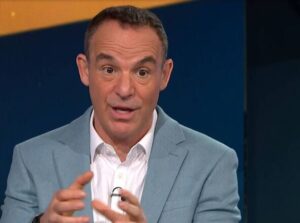
A surprise fall in inflation this morning has triggered a surge in bets that the Bank of England will cut the base rate next month – in a boost to millions of homeowners and the economy.
The chances of a February quarter point cut, bringing the base rate down from 4.75 percent to 4.5 percent, has risen from 60 percent to 85 percent, according to City experts. The fall in the headline rate of inflation from 2.6 percent to 2.5 percent was unexpected – and positive news for the Chancellor Rachel Reeves.
However, more important was a much bigger fall in core inflation, which strips out food and energy and came down from 3.5 percent to 3.2 percent. Similarly, there was a bigger fall in services inflation, which includes areas such as hospitality and slowed sharply to 4.4 percent from 5 percent previously.
The fall in inflation and predictions of lower interest rates led to a fall in the cost of Government borrowing this morning, which will ease pressure on the Chancellor. This morning, she said: “There is still work to be done to help families with the cost of living. That’s why kickstarting economic growth is the number one priority of this Government.
“I will fight every day to deliver that growth and make every part of Britain better off.”
Despite the positive figure, industry leaders and retailers warn that concerns for inflation remain with the headline figure expected to rise towards 3 percent later this year, driven by higher wages, business taxes, energy, oil and food prices.
Following the data release, traders were pricing in a 85 per cent chance of a quarter-point cut in the base rate in February. Tomasz Wieladek, chief European economist at T Rowe Price, said the data was a “clear green light for another series of cuts”.
Rob Wood, UK economist at Pantheon Macroeconomics, said the below-consensus inflation figure gave the BoE a “window of opportunity to cut rates in February”.
Matt Swannell, Chief Economic Advisor to the EY ITEM Club, said: “CPI inflation surprised on the downside in December, edging down to 2.5 percent, from 2.6 percent in November.
“Lower-than-expected services inflation was the reason for December’s softer outturn, with the volatile air fares category knocking 0.1ppt off inflation.”
Warning of price rises to come, he added: “The downward pressure from air fares should unwind in next month’s data, while several other factors point to inflation rising again this year.
“The energy price cap increased by just over 1% at the start of this month and is likely to rise further in April after the recent surge in wholesale gas prices. The weakening in sterling will likely push up the prices of imported goods.
“Businesses passing on some of the cost of higher National Insurance Contributions (NICs) and the introduction of VAT on private school fees will also create upward pressure.
“Though easing wage growth should cool services inflation, the EY ITEM Club expects CPI inflation to average nearly 3 oercent in 2025.”
Gabriel McKeown, Head of Macroeconomics at Sad Rabbit Investments, told Newspage: “The lower-than-expected inflation figure could help to ease some concerns about the government’s fiscal plans, potentially providing more room for manoeuvre in future policy decisions.
“However, while inflation has dropped, it still remains above the Bank of England’s 2 percent target, and when combined with the sluggish economic growth outlook, worsened by the recent Budget, the spectre of stagflation is still not fully vanished.”
Emma Jones, Managing Director at Whenthebanksaysno.co.uk , said: “To see inflation drop is welcome but we are by no means out of the woods yet.
“The inflationary impact of the Budget has yet to hit home and that could mean this is a blip rather than the beginning of a trend.
“How this marginal drop in inflation impacts mortgage pricing and confidence among lenders remains to be seen but it does give the Bank of England a little more wiggle room than it perhaps expected at its next Monetary Policy Committee meeting.”


















